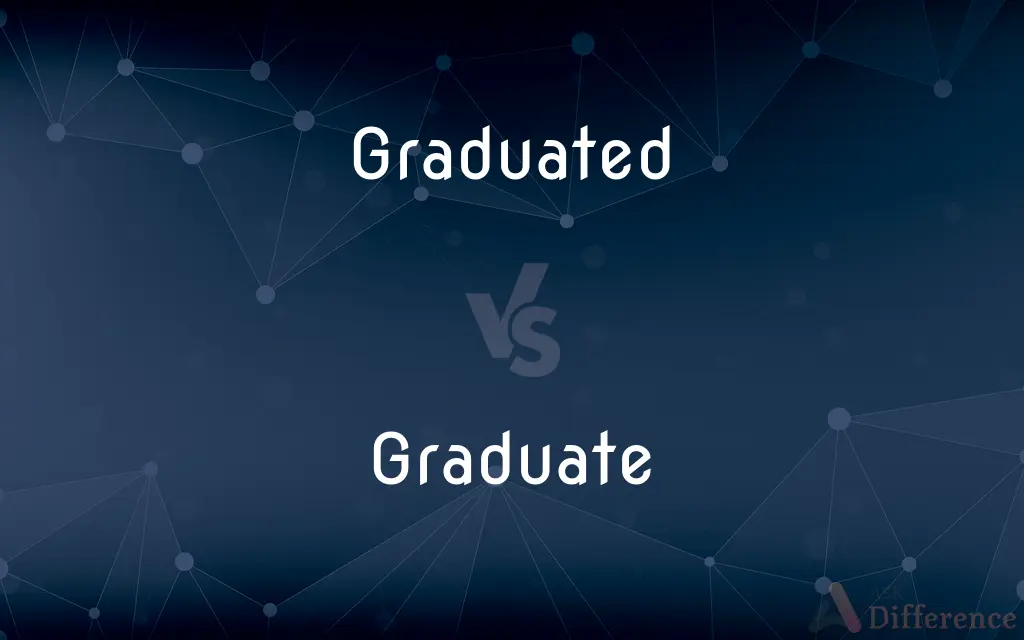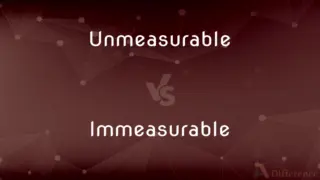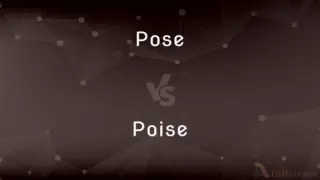Graduated vs. Graduate — What's the Difference?
Edited by Tayyaba Rehman — By Fiza Rafique — Updated on March 29, 2024
"Graduated" is the past tense of "graduate," referring to the completion of a degree or educational program. "Graduate" can be a noun denoting a person who has completed their studies, or a verb meaning to complete a degree or program.

Difference Between Graduated and Graduate
Table of Contents
ADVERTISEMENT
Key Differences
The term "graduated" is primarily used to indicate that someone has completed the requirements of and has been officially awarded a degree or certificate by an educational institution. It is the past tense and past participle of the verb "graduate," implying that the action of completing the educational program has already occurred. On the other hand, "graduate" serves two main functions in English. As a verb, it refers to the act of completing a course of study at an educational institution, leading to the receipt of a degree, diploma, or certificate. The process involves meeting the set criteria and often participating in a commencement ceremony.
In the context of education, "to graduate" implies the process and achievement of passing from one stage to another, usually marked by a formal ceremony or the issuance of a diploma. This transition signifies not just academic completion but also the gaining of the qualifications and recognition necessary to pursue further education or professional opportunities.
"Graduated" also appears in contexts unrelated to education, where it describes something divided into degrees or increments, as seen in tools like graduated cylinders used in laboratories to measure liquid volume with precision. However, when discussing academic achievement, "graduated" strictly refers to the completion of educational requirements.
The distinction between "graduated" and "graduate" (as a noun) becomes clear in sentences where both are used: "The graduate who graduated with honors received recognition for their outstanding academic performance." This sentence illustrates how "graduate" as a noun identifies the individual, while "graduated" describes the action of completing their studies.
Comparison Chart
Definition
Past tense of "graduate," indicating completion of a degree or program.
To complete a degree or educational program. A person who has completed a degree or program.
ADVERTISEMENT
Usage
Describes an action that has already occurred.
Describes the act of completing an educational program. Identifies an individual who has completed their studies.
Context
Academic achievement and completion.
The process and achievement of completing studies. Refers to individuals after they have completed their studies.
Example Sentence
"I graduated from university in 2020."
"She plans to graduate next spring." "He is a graduate of the local high school."
Non-Educational Usage
Describes increments (e.g., on a measuring tool).
N/A
Compare with Definitions
Graduated
Completed an educational program.
She graduated from medical school last year.
Graduate
To move from one stage to a higher stage.
They will graduate from beginner to intermediate level in their training.
Graduated
Marked with degrees or increments.
The chemist used a graduated cylinder for the experiment.
Graduate
To complete academic requirements.
He plans to graduate with a degree in engineering.
Graduated
Moved up to a higher level or stage.
After completing the course, they graduated to an advanced class.
Graduate
A person who has completed a course of study.
The graduates were celebrated at the ceremony.
Graduated
Slowly and smoothly
Graduate
To confer a degree upon.
The university graduates thousands of students each year.
Graduated
To be granted an academic degree or diploma
Most of the entering freshmen stayed to graduate.
Graduate
Someone holding a degree from an institution.
She is a graduate of a prestigious law school.
Graduated
To change gradually or by degrees
"The most weighty of all the arguments against treating the races of man as distinct species, is that they graduate into each other" (Charles Darwin).
Graduate
A person who has successfully completed a course of study or training, especially a person who has been awarded an undergraduate or first academic degree.
Graduated
To advance to a new level of skill, achievement, or activity
After a month of diving instruction, they all graduated to back flips.
Graduate
A graduated cup, tube, flask, or measuring glass, used especially by chemists and pharmacists.
Graduated
To grant an academic degree or diploma to
The school has graduated many gifted chemists.
Graduate
Successfully complete an academic degree, course of training, or (in North America) high school
He graduated from Glasgow University in 1990
He graduated in the summer with a 2:2 degree
Graduated
Usage Problem To receive an academic degree from
How many chemists graduated the Institute last year?.
Graduate
Arrange in a series or according to a scale
The stones were graduated in height from the lowest near the entrance to the tallest opposite
Graduated
To arrange or divide into categories, steps, or grades
Graduate an income tax.
Graduate
Change (something, typically colour or shade) gradually or step by step
The colour is graduated from the middle of the frame to the top
Graduated
To divide into marked intervals, especially for use in measurement
Graduate a thermometer.
Graduate
To be granted an academic degree or diploma
Most of the entering freshmen stayed to graduate.
Graduated
One who has received an academic degree or diploma.
Graduate
To change gradually or by degrees
"The most weighty of all the arguments against treating the races of man as distinct species, is that they graduate into each other" (Charles Darwin).
Graduated
A graduated container, such as a cylinder or beaker.
Graduate
To advance to a new level of skill, achievement, or activity
After a month of diving instruction, they all graduated to back flips.
Graduated
Possessing an academic degree or diploma.
Graduate
To grant an academic degree or diploma to
The school has graduated many gifted chemists.
Graduated
Of, intended for, or relating to studies beyond a bachelor's degree
Graduate courses.
Graduate
Usage Problem To receive an academic degree from
How many chemists graduated the Institute last year?.
Graduated
Simple past tense and past participle of graduate
Graduate
To arrange or divide into categories, steps, or grades
Graduate an income tax.
Graduated
(obsolete) In steps.
Graduate
To divide into marked intervals, especially for use in measurement
Graduate a thermometer.
Graduated
Having a university degree; having completed training.
Graduate
One who has received an academic degree or diploma.
Graduated
Marked with graduations.
Graduate
A graduated container, such as a cylinder or beaker.
Graduated
Arranged by grade, level, degree.
Graduate
Possessing an academic degree or diploma.
Graduated
(taxation) Increasing in rate with the taxable base.
Graduate
Of, intended for, or relating to studies beyond a bachelor's degree
Graduate courses.
Graduated
(ornithology) Of a tail, having successively longer feathers towards the middle.
Graduate
A person who is recognized by a university as having completed the requirements of a degree studied at the institution.
If the government wants graduates to stay in the country they should offer more incentives.
Graduated
Marked with, or divided into, degrees; divided into grades.
Graduate
A person who is recognized by a high school as having completed the requirements of a course of study at the school.
Graduated
Tapered; - said of a bird's tail when the outer feathers are shortest, and the others successively longer.
Graduate
(Philippines) A person who is recognized as having completed any level of education.
Graduated
Having visible marks and numbers at vertical intervals, permitting one to estimate the quantitity of material contained; - of vessels, most commonly those used in laboratories for containing liquids. See graduated cylinder, etc., below.
Graduate
A graduated (marked) cup or other container, thus fit for measuring.
Graduated
Increasing as the amount taxed increases
Graduate
Graduated, arranged by degrees
Graduated
Marked with or divided into degrees;
A calibrated thermometer
Graduate
Holding an academic degree
Graduated
Decreasing as the amount taxed increases
Graduate
Relating to an academic degree
Graduate
To be recognized by a school or university as having completed the requirements of a degree studied at the institution.
The man graduated in 1967.
Trisha graduated from college.
Graduate
To be certified as having earned a degree from; to graduate from (an institution).
Trisha graduated college.
Graduate
(transitive) To certify (a student) as having earned a degree
Indiana University graduated the student.
The college graduated him as soon as he was no longer eligible to play under NCAA rules.
Graduate
(transitive) To mark (something) with degrees; to divide into regular steps or intervals, as the scale of a thermometer, a scheme of punishment or rewards, etc.
Graduate
(intransitive) To change gradually.
Sandstone which graduates into gneiss; carnelian sometimes graduates into quartz
Graduate
To prepare gradually; to arrange, temper, or modify by degrees or to a certain degree; to determine the degrees of.
To graduate the heat of an oven
Graduate
(chemistry) To bring to a certain degree of consistency, by evaporation, as a fluid.
Graduate
To taper, as the tail of certain birds.
Graduate
(Japanese entertainment) Of an idol: to exit a group; or of a virtual YouTuber, to leave a management agency; usually accompanied with "graduation ceremony" send-offs, increased focus on the leaving member, and the like.
Graduate
To mark with degrees; to divide into regular steps, grades, or intervals, as the scale of a thermometer, a scheme of punishment or rewards, etc.
Graduate
To admit or elevate to a certain grade or degree; esp., in a college or university, to admit, at the close of the course, to an honorable standing defined by a diploma; as, he was graduated at Yale College.
Graduate
To prepare gradually; to arrange, temper, or modify by degrees or to a certain degree; to determine the degrees of; as, to graduate the heat of an oven.
Dyers advance and graduate their colors with salts.
Graduate
To bring to a certain degree of consistency, by evaporation, as a fluid.
Graduate
To pass by degrees; to change gradually; to shade off; as, sandstone which graduates into gneiss; carnelian sometimes graduates into quartz.
Graduate
To taper, as the tail of certain birds.
Graduate
To take a degree in a college or university; to become a graduate; to receive a diploma.
He graduated at Oxford.
He was brought to their bar and asked where he had graduated.
Graduate
One who has received an academical or professional degree; one who has completed the prescribed course of study in any school or institution of learning.
Graduate
A graduated cup, tube, flask, or cylinder; a glass measuring container used by apothecaries and chemists. See under Graduated.
Graduate
Arranged by successive steps or degrees; graduated.
Beginning with the genus, passing through all the graduateand subordinate stages.
Graduate
A person who has received a degree from a school (high school or college or university)
Graduate
A measuring instrument for measuring fluid volume; a glass container (cup or cylinder or flask) whose sides are marked with or divided into amounts
Graduate
Receive an academic degree upon completion of one's studies;
She graduated in 1990
Graduate
Confer an academic degree upon;
This school graduates 2,000 students each year
Graduate
Make fine adjustments or divide into marked intervals for optimal measuring;
Calibrate an instrument
Graduate a cylinder
Graduate
Of or relating to studies beyond a bachelor's degree;
Graduate courses
Common Curiosities
What does it mean to be graduated?
Being graduated means having completed the requirements and received a degree or diploma from an educational institution.
How do you use "graduated" in a sentence?
"He graduated with honors in physics," indicating he has completed his physics degree with high academic distinction.
What is a graduate degree?
A graduate degree is an advanced degree that follows the completion of an undergraduate degree, such as a master's or doctoral degree.
Is it correct to say "graduated college" or "graduated from college"?
Both are commonly used, but "graduated from college" is traditionally more grammatically correct.
What is the process to graduate?
The process to graduate involves completing the academic and practical requirements set by an educational program or institution.
Can institutions other than schools have graduates?
Yes, any program offering a course of study that culminates in certification or a diploma can have graduates, such as vocational schools or training programs.
Why might someone use a graduated cylinder outside of education?
A graduated cylinder is used in laboratories to measure liquid volumes accurately, showcasing the term's application beyond academic achievements.
Can "graduate" be used for any level of education?
Yes, "graduate" can be used for any level of formal education, from high school to postgraduate studies.
What happens at a graduation ceremony?
At a graduation ceremony, graduates are recognized and awarded their degrees or diplomas, often marked by speeches, processions, and the conferring of degrees.
What distinguishes a graduate from an undergraduate?
A graduate is someone who has completed a degree program, while an undergraduate is a student working toward their first (bachelor's) degree.
Share Your Discovery

Previous Comparison
Unmeasurable vs. Immeasurable
Next Comparison
Pose vs. PoiseAuthor Spotlight
Written by
Fiza RafiqueFiza Rafique is a skilled content writer at AskDifference.com, where she meticulously refines and enhances written pieces. Drawing from her vast editorial expertise, Fiza ensures clarity, accuracy, and precision in every article. Passionate about language, she continually seeks to elevate the quality of content for readers worldwide.
Edited by
Tayyaba RehmanTayyaba Rehman is a distinguished writer, currently serving as a primary contributor to askdifference.com. As a researcher in semantics and etymology, Tayyaba's passion for the complexity of languages and their distinctions has found a perfect home on the platform. Tayyaba delves into the intricacies of language, distinguishing between commonly confused words and phrases, thereby providing clarity for readers worldwide.
















































